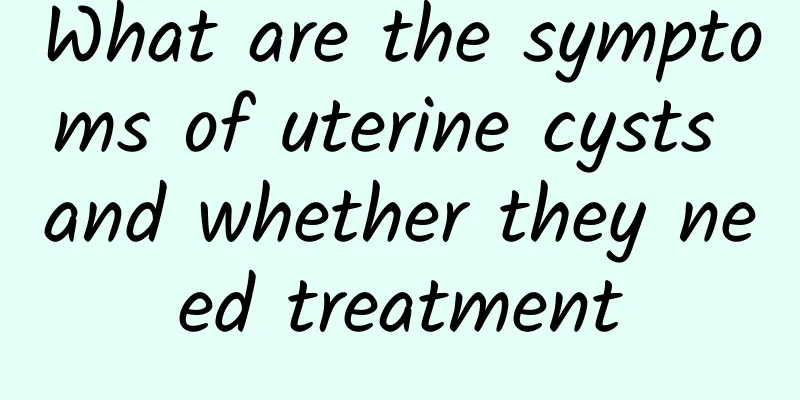What are the symptoms of uterine cysts and whether they need treatment

|
Common symptoms of uterine cysts include abnormal menstruation, abdominal pain, abnormal leucorrhea, etc. Whether treatment is needed depends on the size, nature and specific symptoms of the cyst. If the cyst is asymptomatic and benign, observation can be chosen; if it is accompanied by discomfort or has the possibility of malignancy, intervention treatment is required. 1Symptoms of uterine cysts Uterine cysts are fluid-filled sac-like structures that appear near the uterus or in the uterine wall. Symptoms vary depending on the location, size, and extent of the cyst. Menstrual changes: manifested as excessive menstrual flow, prolonged menstruation, irregular bleeding, etc. This is a common manifestation, which may be caused by the cyst compressing the internal tissue of the uterus. Abdominal discomfort: including dull pain and a feeling of heaviness in the lower abdomen. Larger cysts may cause an increase in abdominal circumference and even compress adjacent organs such as the bladder or rectum, causing symptoms such as frequent urination or difficulty defecation. Abnormal vaginal discharge: If the cyst is accompanied by inflammation, the patient may experience increased vaginal discharge with an abnormal color or odor. These symptoms require regular monitoring. If the symptoms affect the quality of life, it is recommended to seek medical evaluation as soon as possible. 2. Is treatment needed? Whether treatment is necessary depends mainly on the specific condition of the cyst and can be divided into the following three treatment methods: Observation and follow-up: For small benign cysts that do not cause obvious symptoms, doctors usually recommend repeat ultrasound examinations every 3 to 6 months. If the cyst has not increased or regressed, no special treatment is required. Drug treatment: Suitable for patients with mild cysts or menstrual disorders. Doctors usually prescribe hormonal drugs such as short-acting contraceptives to regulate the menstrual cycle, or anti-inflammatory drugs to relieve discomfort caused by inflammation. Surgical treatment: When the cyst is large (>5 cm), the symptoms are severe, or it is suspected to be malignant, surgical intervention should be considered. The main surgical methods include laparoscopic cystectomy, partial hysterectomy, and severe cases may require total hysterectomy. 3 Tips for improving your lifestyle You can improve your uterine health by: Dietary adjustment: Reduce the intake of high-fat, high-hormone foods, eat more foods rich in dietary fiber such as whole grains, fruits and vegetables to lower estrogen levels in the body. Moderate exercise: Exercise helps enhance immune function and improve blood circulation. Gentle exercises such as yoga are recommended to promote healthy uterine function. If you detect uterine cysts during a physical examination or medical consultation, you should communicate with your doctor in a timely manner to develop a corresponding treatment or monitoring plan. Through scientific management, most cysts will not affect your daily life, so early detection and early treatment are particularly important. |
<<: Will cervical pregnancy lead to spontaneous abortion? Will there be bleeding?
>>: Symptoms and treatment of cervical hypertrophy
Recommend
What are the vaginal wash solutions for Trichomonas vaginitis?
What are the vaginal wash solutions for Trichomon...
"Pressing the instep" can slim your calves! Xiaohongshu's popular slimming training, you can get straight and slender fairy legs in just one month
If you want a pair of straight and slender fairy ...
What are the causes of recurrent pelvic inflammatory disease?
What causes the recurrence of pelvic inflammatory...
What kind of health products can patients with uterine fibroids take? Can patients with uterine fibroids take health care medicines?
Uterine fibroids are a common gynecological disea...
Abnormal vaginal discharge after each swimming session
Abnormal vaginal discharge after swimming may be ...
Drinking water not only quenches thirst but also makes your brain sharper
We’ve all heard that drinking water can boost met...
What are the effects of pelvic inflammatory disease?
What are the effects of pelvic inflammatory disea...
What are the common symptoms of ovarian cysts in women?
What are the common symptoms of ovarian cysts in ...
Does thick endometrium require surgery?
Thick endometrium is one of the causes of female ...
When is the best time to have an abortion and what are the methods of abortion?
It is better to have an abortion within 10 weeks ...
What are the treatments for cervical hypertrophy?
What are the treatments for cervical hypertrophy?...
How to alleviate uncomfortable symptoms such as dysmenorrhea through diet and meridian regulation?
Dysmenorrhea is a common physiological problem fo...
Let me tell you in detail about the common dangers of cervical hypertrophy
Cervical hypertrophy is a very harmful gynecologi...
What causes endometriosis?
We must actively grasp the cause of endometriosis...
Eat less rice dumplings during Dragon Boat Festival to avoid excessive calories and sodium
The Dragon Boat Festival is approaching, and hund...









